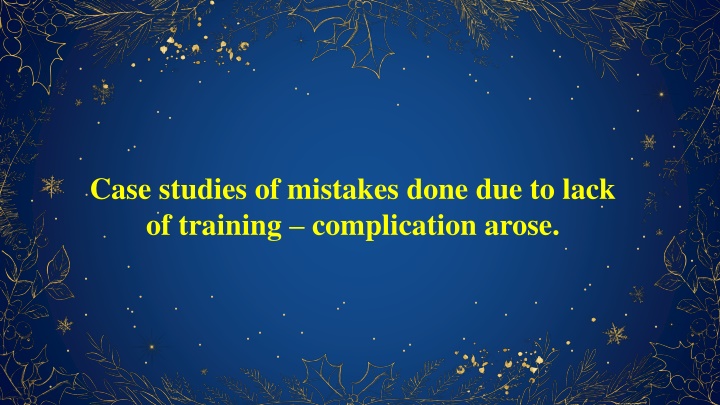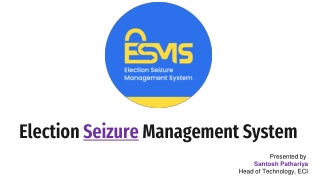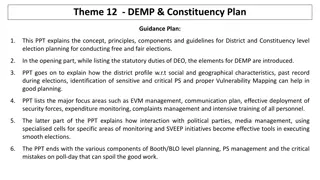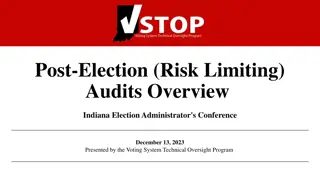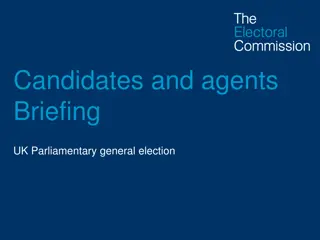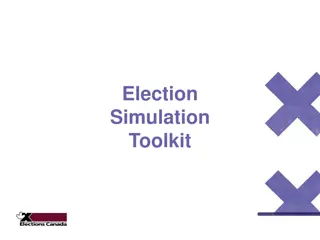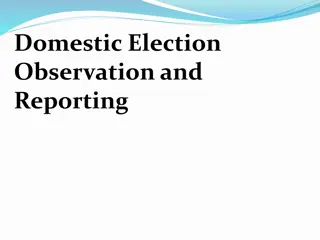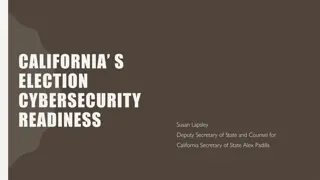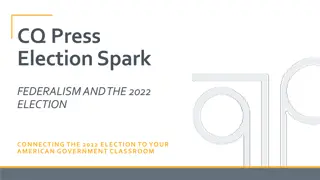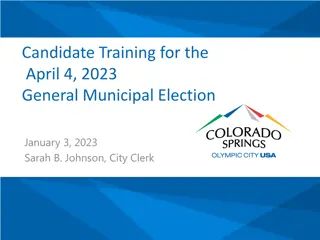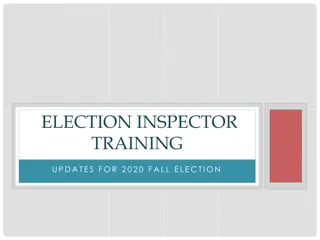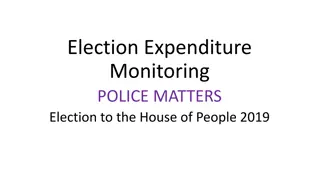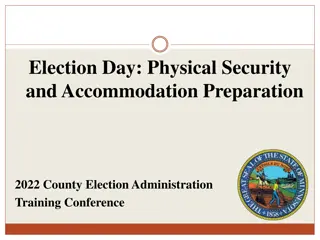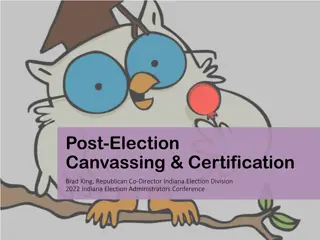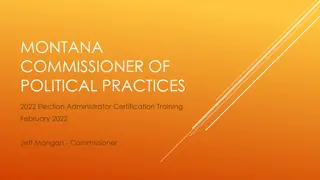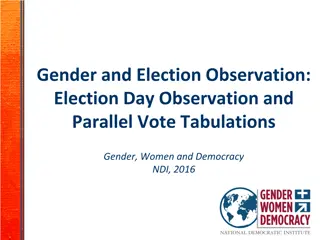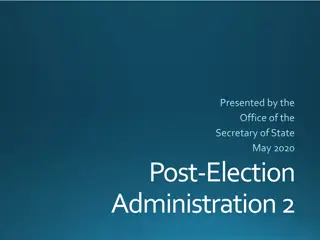Enhancing Election Process Through Proper Training and Facilities
Addressing challenges arising from inadequate training in various election activities, this content emphasizes the importance of proper training to avoid complications. It highlights issues such as polling station setup, awareness creation, essential facilities at polling stations, and criteria for identifying critical polling stations. By focusing on training and ensuring minimum facilities, the electoral process can be significantly improved.
Download Presentation

Please find below an Image/Link to download the presentation.
The content on the website is provided AS IS for your information and personal use only. It may not be sold, licensed, or shared on other websites without obtaining consent from the author.If you encounter any issues during the download, it is possible that the publisher has removed the file from their server.
You are allowed to download the files provided on this website for personal or commercial use, subject to the condition that they are used lawfully. All files are the property of their respective owners.
The content on the website is provided AS IS for your information and personal use only. It may not be sold, licensed, or shared on other websites without obtaining consent from the author.
E N D
Presentation Transcript
Case studies of mistakes done due to lack of training complication arose.
Improper /inadequate training Activity wise complications 1. Polling station 2. Polling personnel 3. Electoral Roll preparation 4. Training 5. Nomination 6. EVM/VVPAT issues 7. Ballot 8. Postal Ballot 9. ETPBMS 10. Absentee postal Ballot voting 11. MCC 12. DC/RC 13. Mock poll 14. Poll 15. Counting 16. Result declaration 17. Post counting activities 18. Election Expenditure Monitoring
Polling station issues Appropriate awareness of any new booth created/ auxiliary voting arrangement - Proper awareness to be made to electors /candidates/political parties about the voting arrangement in newly created booth and auxiliary Booth If Political parties are not consulted to create new booth/auxiliary booth The E.Roll preparation for auxiliary booth is not done correctly resulting complication for polling parties/electors Pattern of signage is not followed Draft publication of list of PS Final publication - Approval from ECI sharing of list of PS with political party/candidates AMF specification not followed Criticality assessment done on wrong criteria - Incomplete analysis to decide the degree of sensitivity may lead to gaps in election- management for a clean poll.
Assured Minimum Facilities (AMF) are ensured by the DEOs at each Polling Station ECI Inst: 464/INST-AMF/2022/EPS Dated: 10th June, 2023 Manual on DEMP 2023 Page No. 8 and 9 1. Polling Station at Ground Floor 2. Provision for Ramp ( Gradient (ramp of maximum gradient 1:12) 3. Provision for Drinking Water 4. Adequate Furniture 5. Proper lighting/Electricity arrangements 6. Proper Signage 7. Toilets (separate toilets for male and female) 8. Shade in Polling Station (15ft X 15 ft) 9. Provision for Creche for children 10. . Voter Assistance Booths (VAB)- To correctly locate Booth 11. Display of Voter Facilitation Posters (details of Polling Station Details (VFP-1), List of Candidates (VFP-2), Do s and Don ts (VFP-3) and Approved Identification Documents & How to Vote (VFP- 4) 12. Other facilities a)Medical Kit b)Provision for Transport Facility. c) Queue Management. d) Appointment of Nodal Officers e)Volunteers - Volunteers from NCC/NSS/Scout & Guides may be deployed to manage the voters queue, assistance to Identified PwD and Senior 4
Polling Station issues OBJECTIVE CRITERIA FOR IDENTIFICATION OF CRITICAL POLLING STATIONS: PSs having vulnerable pockets and PSs located in identified vulnerable area. PSs where polling was more than 90% and where more than 75% of votes have been polled in favour of one candidate in last election. PSs where polling is less than 10% PSs where Re-poll conducted owing to vitiation of poll process and electoral offences such as booth capturing, during any election for Lok Sabha or State Legislative Assembly in last five years PSs where any sort of violence took place on poll day leading to lodging of FIR, during any election for Lok Sabha or State Legislative Assembly in last five years. PSs with higher than constituency average % of Absentee, Shifted and Dead (ASD) voters (Ref: Constituency Average % of ASD Voters=Total number of ASD Voters in the constituency/ Total number of polling station) Information regarding abnormal law and order situation in any particular area. All Polling Stations identified under Vulnerability Mapping shall be designated as Critical Polling Stations. ECI Instruction No. 464/L&O/2023/EPS (VM) Dated: 21st June, 2023
MEASURES TO BE TAKEN FOR CRITICAL POLLING STATIONS: Critical Polling Stations shall have CAPF deployment to the maximum possible extent. The list of Critical PS to be given to the Commanding/Assistant Commanding Officers of CAPF to keep a watch. Deployment of webcasting or videography and any other monitoring system as a civil measure. Webcasting shall be done in all Critical PS or at least in 50% of total PS including auxiliary PS, whichever is higher. Critical events in and around the PS to be videographed. Micro Observer may be deployed as additional civil measure. The Presiding Officer of critical Polling Station shall be specifically briefed to ensure that the EPIC/ approved identification document, if any, are properly verified and reflected in the Remarks column of Form 17 A. ECI Instruction No. 464/L&O/2023/EPS (VM) Dated: 21st June, 2023
E.Roll and EPIC related mistakes due to lack of training Complications Mistakes Abnormal additions part-wise to be scrutinized and super checked for anomalies. Accepting Form-6 when the system has flagged the possibility of repeat entries to be allowed only after reference to a supervisory level and due enquiry by BLO Limited sharing of passwords and frequent changes of passwords or biometric identification system should be kept in place. Time-bound disposal of forms to be insisted. Daily review of pendency of forms. Special care to be taken to decide on forms received through voter.eci.gov.in & other online platforms. A list of such important electors to be maintained part-wise in every assembly constituency. EROs to keep close watch to ensure non removal of such important voters. Approval of Form-6 without due checking. Acceptance of Form-6 even after duplicate warning by system. Unauthorized approvals by using the ERO login Delay in deciding forms cause submission of repeated forms. Inadvertent deletion of important electors such as renowned art personalities, political representatives, senior public servants, judicial officers, etc. Motivated deletions, or excessive delay resulting in non-approval, in respect of targeted populations. Acknowledgement of Form-6 not given to applicants, thereby preventing tracking of pending applications. All abnormal deletions part- wise must be scrutinized by EROs/DEOs. Long delay in processing of forms must be reported by the system and reviewed at higher level. Generation of specific acknowledgement numbers to be made compulsory, by which processing of forms can be tracked by the applicants. This should be followed in case of offline applications also. Option for tracking status of forms by EPIC number should be made available. Focused SVEEP activities for prospective electors have to be taken. Awareness regarding e-EPIC downloading facility to be intensified. Encouraging unique mobile number linking for better electoral Services Any modification in internet mode to be made password- protected so that no one is able to modify other electors details. Part-wise segregation of EPICs should be made after approval of registration. Under no circumstances should EPICs be distributed by political representatives. Ensuring timely free delivery of EPIC through registered post Inadequate response from the eligible youth for the facility of 4 qualifying dates Wrong modifications by electors of other electors details. Delay and confusion in delivery of EPIC. 7
Complications Mistakes Non-inclusion of eligible persons. Adequate outreach programmes to be conducted. Appropriate SVEEP & implementation of 4 qualifying dates in a year effectively. Before draft publication of electoral roll, members of a family shall be clubbed so that on day of poll, all family members cast vote in the same polling station. Deletion lists to be published, shared and communicated wherever feasible. Proper monitoring and adherence to SOPs to avoid inadvertent deletions. Appropriate publicity and efficient grievance- redressal system. No family tagging Inadvertent deletions. Deliberate exclusion of certain sections and areas. Possibility of motivated deletions. Abnormal deletions, section-wise and part-wise, to be scrutinized for anomalies. Inclusion of ineligible electors. Cross-verification, random checks and complaint- monitoring systems to be established. Scrupulous adherence to de- duplicating checks to be ensured. Monitoring through generation of DSE, PSE and repeated EPIC list followed by due verification. Electoral rolls of bordering constituencies to be compared; special communication drives to avoid double registration. Repeated entries. Double registration in bordering constituencies. 8
Complications Mistakes Untrained Forms, acknowledgements, blank fields. Delegating without authority for bulk submission of forms. and uninspired staff committing mistakes in insufficient documents Adequate training to be given for avoiding errors and mistakes, appropriate levels of supervision. Inadequate knowledge of the new forms as a risk because of which wrong forms may be filled for various services Proper identification- cards/ badges to be issued to BLOs and Data Entry Operators. Taking declaration of BLA s authenticating bulk form submission as per ECI guidelines. Noting down the proper part number to minimize the proceesing time and ensuring one- to-one coordination between BLOs and BLAs, involving RWAs in verification, so as to resolve issues when applicant is not available on inspection. Monitoring by supervisory officials through super- checking mechanism in ERONET Time-lines to be set and checked. Alert generation through SMS and colour coded monitoring is entailed. taken, not giving Incorrect field verification by BLOs. Delay in submission of field- inputs giving scope for repeated Form-6. The importance of unambiguous clarity on citizenship requirements to be communicated to EROs. Referring to appropriate authorities and adhering to guidelines for determination of doubtful citizenship. First-time electors to be scrutinized with elaborate cross- checking of documents. EROs to be briefed about their authority to reject Form-6 on not being personally satisfied as per appropriate guidelines. Birth documents to be checked in case of young applicants. Physical verification by BLO to be a must before considering acceptance of Form-6; cross- checking with neighbours, verifying other documents, and checking about possible repeated entries in adjoining constituencies should be done. Possibility of inclusion of foreign nationals. Lack of vigilance in non- border cities in registering electors. Registration of under- age persons. Carelessness in Non-residents registration. 9
Mistakes in preparation of PP database & deployment Seniority is not maintained, senior is posted under junior. Exempted category is deployed for duty like PWD Female deployment rule is not known Randomisation timeline is not followed Remuneration is credited wrongly/failed due improper database maintenance Restriction of home AC, working AC is not followed properly If any exemption is required in deployment of PP, the proposal is placed at last moment before the Commission. 10
Training related mistakes Inadequate training may lead to inefficiency, errors and possible vitiation of poll- process. Training of Presiding Officers and Polling Officers must be done in a meticulous manner in a class- room atmosphere. Practical demonstration and proper handling of EVMs should be facilitated. Conduct of mock poll and clearing mock poll data must be instructed. POs must be told to inform the supervisory officers in case of any serious difficulty or unexpected happening. Hands-on training for filling up of various forms. Evaluation component at the end of training. Presiding Officer and polling /counting staff must be given hands-on training on handling EVMs and VVPATs. Inadequate training VVPATs hands EVMs - on and on 11
MCC related mistakes Complications/ corrections Mistakes Defacement of government /public private property Concerned authorities should be sensitized during poll preparedness regarding commission s policy related to defacement of properties and deletion of all references on politicians/ministers on the official website during election period. In the case of advertisements, the source of which is traceable, the following action to be taken: If the advertisement is with the consent or knowledge of the candidate, it will be treated to have been authorized by the candidates concerned and will be accounted for in the election expenses account of the candidates If the advertisement is not with the authority from the candidate, then action to be taken for prosecution of the publisher for violation of section 171 H of IPC (incurring expenditure in advertisement without written authority from the candidate concerned. All departments to be informed prior to schedule announcement about the need to identify such publicity material and be prepared for corrective action Government department should publish advertisements well before election - announcements. To communicate all concerned authorities to follow equitable distribution policy on political advertisement among all players. Advertisements in print media, some surrogate and some under the name of some organizations Departmental web sites take time in removing political photographs. Running advertisements, up to the day of announcement of polls. Monopoly of a particular political party for advertisements at places
Complications/corrections Mistakes Presence of political functionaries /party workers/ procession functionaries/ campaign functionaries etc. who are not voters of the constituency in the constituency after the campaign period is over. Election administration/police to: Check marriage halls/community halls etc. where such people are kept. Verify lodges and guesthouses to keep a track of the list of occupants. Set up check posts in the constituency borders and track the vehicular movement from outside the constituency. Verify the identity of the people/group of people in order to find out whether they are voters or not and establish their identity. Functionaries of all the autonomous organizations to be instructed to use the official vehicles only for commuting between office and residence and to attend any official meeting within the headquarters itself. The district administration to be advised to keep strict vigil on the movement of such vehicles. All DEOs and ROs to be directed that wherever a case of MCC or related violation by star campaigner in their respective constituency observed, the same shall immediately be brought to the notice of the CEO for taking appropriate guidance/approval. The CEO shall report the action taken to the commission for immediate follow up action. Misuse of the vehicles provided by the State Government to non-official functionaries viz. chairman, dy. Chairman, president, vice president, commissioners etc. of various autonomous organizations during electioneering. MCC violation by leader specified under section 77(1)(star campaigners) 13
MCC Operational MCC Operational Teams to be trained adequately: Teams to be trained adequately: Video Surveillance Team (VST) Video Viewing Team (VVT) Complaint Monitoring Cell & Call centre to deal with complaints from -C-Vigil/ NGS/ Voter helpline app / Voter portal/ Toll free no. 1950 (call centre)/ Mail/ Hard copy Media Monitoring/ Viewing Team Teams for removal of Defacement of the Government Premise Teams for permission of Campaign Vehicles/ Meeting/ Procession etc through SUVIDHA and also making necessary arrangement for booking of expenditure in favour of the Candidates Reporting Cell 14
Activities to be taken up immediately after announcement Defacement of Govt. property To be removed within 24 hrs from announcement of elections To be removed within 48 hrs from announcement of elections Defacement of public property (Railway stations,Bus stands,Airports,Railway bridges,Roadways,Govt. Buses,Electric/Telephone Poles,etc Total ban on use of Official vehicle by any political Party or candidate or any other person connected with election To be complied within 24 hrs of announcement of elections Advertisement at the cost of public exchequer Immediate action to remove any ad in print/electronic media soon showing achievements of the Govt. soon after announcement Photograph of Political functionary at official website Immediate action to remove or hide FS/SST/Video Team Complaint monitoring System/Call centre 24x7 Immediately activated To be operational within 24 hrs 15
Media Complications/corrections Mistakes Regular media briefings to be done by CEO or the next senior most officer till the polls are over. Training to be organized for media personnel at all levels. Media persons having authority letters are to be allowed entry into polling stations and counting centres. Gaps in Communication cause uncertainty, confusion and rumors. Media persons with authority letters can be allowed to enter the polling stations and counting hall by the returning officer after verification of their authority letters. However, they will be allowed inside the counting hall in very small numbers and in batches and the actual numbers will be determined taking into account the size of the counting hall, space available and other relevant factors. Authority letters issued will be subject to the conditions imposed by the Commission as are mentioned in the authority letters, like media persons not being allowed to go near the voting compartment, photographers not to take photographs/films which may violate secrecy, etc. Any violation of such conditions will automatically invalidate the authority letter and will also invite penal action. Media engagement Dispute regarding entry and videography Unattended media reports convey an impression of laxity. From three months before the likely announcement of election- schedules, all relevant matters reported in media need to be tracked for necessary action. An SOP to take down violations on social media platforms under voluntary code of ethics is shared by ECI to CEOs before elections for quick response. 25.A.1.Malformation, misinformation, disinformation, and Fake news in social media
Nomination Complications/corrections Mistakes It must be doubly checked that the designation of the Returning Officer in all notifications and notices is the same as notified by the Election Commission in the State Gazette. Incorrect Notification about designation of RO may lead to legal complications. hasty receipt of nomination papers and Every single nomination and accompanying documents should be checked at documents may lead to avoidable rejections the time of submission, and deficiencies if noticed should be communicated later. to the candidate/proposer in writing, mentioning specific time and date before which the said defect must be got rectified to the satisfaction of the RO. To prevent cases of non-SC/ST persons contesting election from reserved constituencies, RO must insist to produce SC/ST certificate issued by the competent authorities. Reminder in format C3 should be given to the persons having criminal antecedents and filing nominations.
Complications/corrections Complications/corrections Mistakes Mistakes Wrongful rejection After doing adequate security and Old symbol books may lead to mistakes in allotment. copies of Only the latest document issued by the Election Commission for the specific election should be consulted, while deciding about the list of symbols and their particular print types. In case of doubt, the office of CEO or ECI Division concerned must be consulted. of a nomination can analysis, in case of any doubt, the become a valid guiding principle should be to give the ground for setting benefit of doubt to the candidate, as aside the whole wrongful rejection can certainly election. become a ground for challenging the election. Encouraging optional online Non-standard photograph delay printing of ballot papers. Even at the time of symbol allotment, any non- standard photographs, if already detected, should be correctly replaced by the candidate. To avoid complaints later, the photo to be used in ballot paper should be obtained in writing by the candidate. Name and signature can be taken behind a spare copy of the photograph that can be kept in nomination file for future references. submission of affidavit with adequate may safeguards. Returning officers must be aware of the correct legal position about the impact of stay order of the appellant court on execution of sentence passed by the trial court for the purpose of disqualification of the persons. 18
Complications/corrections Mistakes No advance planning for unexpected large number of candidates Necessary arrangement of additional BUs and other arrangement to be preplanned. Non Publication of Criminal antecedent The candidate and political parties have to publish the criminal antecedent according to the three schedule/ tranches prescribed which should be monitored. 19
Case where the election notification was rescinded on account of improper public Notice. In a bye-election to the Lok Sabha in Uttar Pradesh, the Public Notice was issued by the DM whereas the ADM was the RO. When this error was noticed, the ECI cancelled the election notification and issued a fresh notification subsequently. (Akbarpur PC/ Ambedkar Nagar)
Receiving of nomination forms on holidays (ECI instruction No. 4/ECULET/FUNC/JUD/SDR/VOL.I/2016 Dated: 29th December, 2016) Returning Officers should not receive any nomination papers on 2nd and 4th Saturdays, which have been declared as holidays under the Negotiable Instrument Act, 1881 by the Finance Ministry.
Proposers-clarifications Under rule 2 (2) of C.E. Rules, 1961, in case of proposers who are illiterate persons, their thumb Impression has to be attested by the RO or an officer authorized by ECI. Therefore Thumb Impression has to be affixed in the presence of the RO or the authorized officer (an Administrative Officer not below the rank of SDO has been authorized for the purpose by ECI) . Form of nomination paper Form 2A for Lok Sabha and Form 2B for Legislative Assembly maybe seen for reference.
For Reserved Constituencies For reserved constituencies, candidates have to give a declaration specifying the caste/tribe to which he/she belongs. Such caste/tribe should be included in the list of SC/ST in that State [Sec.33 (2)] . It is desirable to obtain certificate to prove SC/ST status.
Candidate who is an elector of a different Constituency: Certified extract of entries in the relevant roll to be submitted [S.33(5)] If not filed with nomination, this can be filed by the time of scrutiny. RO to give a notice - in the check-list in the format as per ECI direction dated 7th February, 2019.
Affidavits by candidate Candidate is required to file affidavit in Form-26 (revised vide ECI letter dated 7th July 2017 & 28-02-2019.) The affidavit to be filed along with nomination paper or up to 3:00 pm on the last date of filing nomination. All the columns in the affidavit must be filled in. No column should be left blank If candidate does not have information to be filled in a column, he/she should fill Not Applicable / Nil/Not Known The affidavit should be typed or written legibly and neatly.
Formats Action to be taken by Platform C1 C2 Candidates Political Parties Newspaper & TV Newspaper, TV & Political Party's Websites C3 Returning Officer Reminder to the candidate by RO for publication. Report to be submitted before the DEO (in case of Elections to Lok Sabha and Vidhan sabha) or the RO (in case of elections to Rajya Sabha and Vidhan Parishad) C4 Candidate to DEO Political Parties to the CEO of State Concerned CEO to the Commission C5 Report about publishing the declaration. C6 Report regarding compliance by the Political Parties C7 Political Parties Political Parties to the Commission Newspapers, Social media platforms & website of the party C8 Compliance report to be sent by the Political Parties Information with regard to the individual with criminal antecedent selected as candidate by political parties. (by Last Date of Nomination) CA Returning Officer
To be received from candidates Sl No 1 2 3 4 5 6 7 8 9 10 11 Items Receipt of deposit Form 2A/2B (Nomination Form ) should be filed up in all respect Affidavit in Form 26 Form A & Form B SC &ST Certificate (If applicable ) Original to be shown and one copy self-attested Copy of Epic of Candidate (Self Attested) Copy of Epic of Proposer /Proposers (Self Attested) 8 copies of stamp size Photograph (2cmX2.5cm) to be signed at the back side by candidate Declaration for submission of photograph by candidate Form 8 (appointment of election agent) signed by candidate 4 copies of photograph of election agent to be signed at back side by election agent 12 Copy of Epic of election agent (self-attested) 13 Format for specimen signature of candidate and election agent 14 Information sheet on contact nos. & bank particulars No dues certificate from the agencies concerned in respect of rent, electricity charges, water charges and telephone charges in case of Govt accommodation of candidate (if applicable as per affidavit) 15 16 Data required for encore declaration
Ballot paper printing Complications/corrections Mistakes Defective printing with mis-spelt names, blurred photograph, incorrect sequence, etc may lead to complaints and even be a ground for election petition. Unaccounted ballot papers may be subject to mischief. The list of Contesting Candidates (Form 7-A) must be personally scrutinized by the Returning Officer and cross- checked with the particulars given in the nomination form. All cancelled or defective ballot papers should be destroyed under proper supervision. All final ballot papers should be counted physically by election- staff from RO office and dispatched with proper security. 28
ETPBMS Complications/corrections Mistakes Faulty preparation of Postal Ballot Paper Adequate Training must be imparted. All safety protocols must be followed. Time line of ETPB generation not followed Within 24 hours to be uploaded in portal, correction can be made till 48 hrs Wrong envelope/ wrong marking on envelope or on ballot Training to be done for service voters 29
Electronically Transmitted Postal Ballot Management System Electronically Transmitted Postal Ballot Management System (ETPBMS) developed by Election Commission of India (ECI) with the help of Centre for Development of Advanced Computing (C-DAC) The developed System is implemented inline with the existing Postal Ballot System. Postal Ballot will be transmitted through Electronic Means to the voters with in 24 hours of publication of Final list of Candidate It enables the voters to cast their vote on an electronically received postal ballot from their preferred location, which is outside their originally assigned voting constituency. This system would be an easier option of facilitating voting by the electors as the time constraint for dispatch of postal ballot has been addressed using this system.
Electronically Transmitted Postal Ballot System Class of electors who would be eligible for Electronically Transmitted Postal Ballot System Service Voters, other than those who opt for proxy voting (Classified Service Voters) The spouses of persons referred to in clauses (i) Overseas Electors
Electronically Transmitted Postal Ballot System Download: Service Voter Generates ETPB & PIN for Service Voters Returning Officer Transmit/Dispatch PIN Record Office Service Voter Transmit/Dispatch ETPB Transmit/Dispatch ETPB Unit Office Download ETPB
Postal Ballot Complications/corrections Complications/corrections Mistakes Mistakes Timely issuing of RO should ensure that all PB are Mistake in Postal ballot Nodal officer(PB) must be a senior PB issued within the time. No ballot distribution of administrative officer to ensure the reach of PBs paper can be issued after the stage of postal ballot; to all concerned with regular monitoring and preparing marked copy of electoral inadequate reach to follow up. roll for supply to the presiding the election duty Risks associated with absentee postal ballot to be officers for conduct of poll. (RO) staff including factored security personnel Lapse in sending In case of special voter, RO should A data base of persons to be issued postal PB to special voters deliver or cause them to be delivered ballots on account of being on election duty the PB and forms personally. (RO) should be prepared well in advance. Ensure Information to All recognized political parties should that among the police personnel, only those political parties and be informed in writing about date, who will be engaged in election related duties candidates time and place of voting through PB on the day of poll shall only be eligible for at the facilitation centre and obtaining PB. Hence obtain the list of such receiving of polled PB by the post police personnel well in advance. office. (RO/DEO) 33
Absentee Postal Ballot voting Mistakes Complications/corrections Houses missed by BLO during application form distribution Ensuring BLOs visit all houses and distribute the application forms to targeted electors Miscommunication on benchmark disability certificate to electors Good IEC (Information, Education, Communication) activity for Elector and the stake holders for obviating miscommunication Secrecy violated during voting at home Adequate training to polling party Improper storage of PB Setting up of strong room as per ECI guideline 34
Major aspects of POSTAL BALLOT FOR ABSENTEE VOTERS Proper training to be given for AVSC, AVPD and AVES, AVCO voting: identification of Target electors No. of days required for distribution and collecting back of Form-12 D Fully knowing the role of MO, PP, Videographer and security personnel and BLA No. of Polling Teams with Security Personnel and videographer required for voting Identification of Strong rooms for safe custody of polled PB Training of the polling teams Maintenance of secrecy Extensive awareness programmes IT intervention for easy preparation of registers & documents and end-to-end tracking of the process
Challenge of Absentee Voters Postal Ballot and SVEEP Challenge of Absentee Voters Postal Ballot and SVEEP Issues regarding AVPB: Intimation of dates of Vote to all Absentee Voters. Formation of multiple polling teams. Route Chart for the polling team comprising of PP, MO, Police. Ensuring Team with vehicles, Police, Videography. Involvement of political parties. House Visit of PWD and 80+ electors by BLO, ERO, ADM, DEO. Maintenance of secrecy of voting Security of unpolled and Polled ballot Security of daily storage of polled ballots
AVES related mistakes Who are eligible (as will be mentioned in notification of ECI) The Election Commission hereby notifies that the persons employed in the following essential services: Railways, Metro Railway Kolkata, Post and Telegraphs, Doordarshan, All India Radio; Media persons authorized by ECI for poll day; Aviation; and Shipping.
How to submit the application and processing by R.O The departments of the notified category of electors may be informed accordingly, and may be asked to nominate "Nodal Officer" for this purpose of the postal ballot facility. AVSE will submit their application in Form-12D to the concerned R.O, which is required to be verified (Part II of Form 12D) by the Nodal officer appointed by the organization concerned. [Important portions of Form-12D are marked in YELLOW ] Last date of submission of application for postal ballot by AVES N+5 Form-12 D available in ECI/CEO/DEO s Website.
How to submit the application and processing by R.O On receipt of application from AVES - Returning Officer / ARO in-Charge will- a) Scrutinize the electoral particulars of the applicant/ elector b) If found correct, list of eligible AVSE- in Annexure-A (List on the basis of which issue of postal ballot will be made) c) PB marking on the Electoral Roll- authentication of marking
Voting Process (Rule 27E & 27F of CE Rules, 1961) Identification of Postal Voting Centre (for issuing Postal ballot papers and collection of polled Postal ballot papers- similar to PB Facilitation counter of Polling Personnel)- to be identified by the R.O Shall be located within the constituency Fixation of Schedule of issue of Postal Ballot Paper and Voting: Three consecutive days before P-3 Time 9 AM- 5 PM
Voting Process (Rule 27E & 27F of CE Rules, 1961) Intimation regarding issue of Postal Rallot Paper and Voting All the persons who have applied for postal ballot paper in AVES category shall be duly intimated about the following: The full address of the Postal Voting Centre venue where postal ballot voting is to be arranged ; Dates on which the postal ballot voting facility will remain open; The hours fixed for postal ballot voting. By SMS to the telephone no. in the Application (12D), by the BLO, by the Nodal Officer of the department /Organisation concerned and advertisements in local newspapers and also through the website of the District Election Officer.
Arrangement of Polling at Postal Voting Centre Intimation to the Contesting Candidates - shall be given in writing a) the schedule b) provision of appointment of Polling Agents - they may appoint Polling Agents for watching the proceeding- Appointment in Form-10 Appointment of Staff at PVC:- - 2-3 nos. depending on the number of AVES - Gazetted officer for attestation of Declaration in Form 13A
Voting Procedure- continued folding and placing the marked ballot in the smaller envelope and closing the envelope Voter will go to the Voting Compartment- cast his/ her vote by using Tick ( ) or Cross ( ) against the name of the candidate of choice- Secrecy of voting shall have to be ensured. Placing the declaration in Form l3A, duly filled up, signed and attested along with closed envelope (Form l3B) containing the marked ballot paper inside the larger envelope (Form I 3C) Closing the larger envelope and dropping it in the box kept in the PVC.
EVM/VVPAT Complications/corrections Mistakes Non-deletion of mock- poll votes may result in all votes becoming invalid and vitiate the atmosphere. Along with mock poll conduct report, mock poll data deletion report must be collected from every polling station. channel to be kept miscommunication. Sector Officer shall ensure while visiting to assigned polling stations. Communication clear to avoid Casual challenge of test vote to be discouraged Presiding Officer to follow detailed guideline under 49MA. The machines should not be carried in vehicle other than assigned vehicle. Machines should not be kept in place other than designated location. Precautionary training required. Machines to be moved through GPS tracked vehicle. Machines found in unauthorized place/ vehicle
ADMINISTRATIVE SAFEGUARDs ENSURE SECURE HANDLING AND MANAGEMENT OF EVMs AT ALL TIMES 1. 2. 3. Allocation & Movement Preventive check of all CU User Acceptance Test for newly manufactured EVM/ VVPAT First Level Checking Training & Awareness Candidate Setting Randomization Mock Poll Poll Day Checks 4. 5. 6. 7. 8. 9. 10. Poll Closure & Transportation 11. Storage & Security 12. Counting Day Protocol 45
EVM-VVPAT Management Cycle First Level Checking (FLC) Counting First Randomisation Poll Day Second Randomisation Commissioning
Critical Mistakes 1. First Level Checking of EVMs and VVPATs Non-updation of FLC-OK or FLC-Reject status in EMS through Mobile-App on day to day basis. FLC of VVPATs without using Dummy Ballot Paper on BU. Non-Uploading of 16 candidates (including NOTA) Dummy Symbols in the 1% VVPATs used for testing with 4-BUs having 64 dummy symbols (including NOTA) Irregularity on use of Dummy Symbols 2. Commissioning of EVMs and VVPATs Non-checking of candidate symbols uploaded in VVPAT during commissioning. In case of M3 EVMs, M3 VVPATs should be connected at the time of commissioning of the EVMs otherwise EVM will not accept a VVPAT at a later stage. 3. Transportation of VVPATs Lock paper roll when transporting the VVPAT from one place to another
4. Dispersal Do not switch on the VVPAT in broad daylight at the time of dispersal as the VVPAT may go into error mode. 5. Mock-Poll on Poll Day Not pressing the CLOSE button of CU after mock-poll. Not matching the mock-poll result of the CU with the VVPAT Paper Slips. Not removing the mock-poll paper slips from VVPAT Non-deletion of mock-poll data from the Control Unit. When setting up the EVMs and VVPATs in the polling station, the VVPAT should be positioned so as to avoid direct light from falling on it. Do not position the VVPAT near an open window or directly under a bulb or halogen lamp.
6. During Poll Conducting mock poll, in case of replacement of VVPAT only. Mock poll is not required to be conducted in case of only VVPAT replacement. In case of non-functioning of CU or BU replacing only CU or BU. In such case both BU and CU along with VVPAT shall be replaced. Non-pressing of CLOSE Button after completion of Poll. Damaging any seal of BU/CU/VVPAT. 7. General Do not repeatedly switch ON and OFF the VVPAT as it will deplete the battery as well as paper roll. Switch OFF the CU when connecting or disconnecting the EVMs/VVPATs and do not pull the cable for disconnecting.
Examples of Violation of EVM-VVPAT Protocol & Guidelines 1.EVM Found in Sector Officer s House in Guna AC, Madhya Pradesh in violation of ECI Protocol. Enquiry was ordered by ECI 2.Tamil Nadu Elections 2021 A duo carrying two EVMs and a VVPAT machine on a two-wheeler were caught by motorists and passers-by in Velachery after polling ended. Action was initiated against the concerned for not following ECI guidelines
